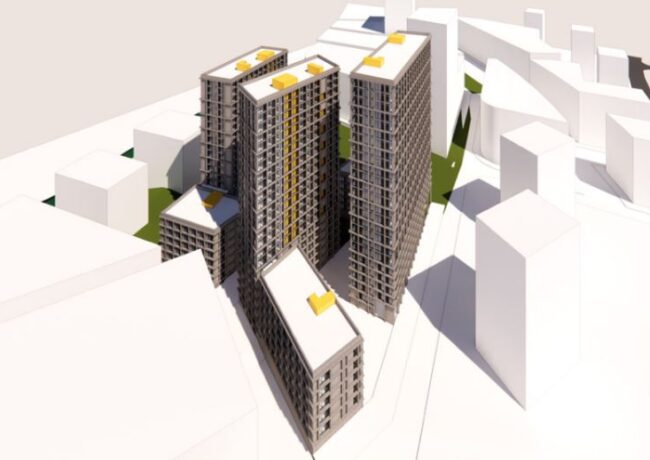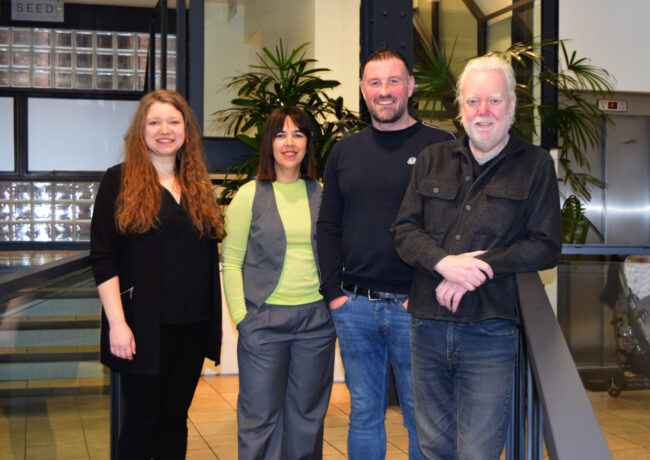RIBA president: Architects aren’t valued highly enough
“There seems to be an inability among architects to demand adequate payment for their services,” according to RIBA president Ben Derbyshire. However, rather than blaming clients, “we need to ask what society needs from us.”
Derbyshire is outgoing president of the Royal Institute of British Architects, a position which is held by a practicing architect elected to the role by members every two years. Derbyshire is also head of HTA Design, a firm with 150 staff across the UK, including 10 people in Manchester where it has operated for five years.
Place North West met with Derbyshire at the launch of HTA’s new office, in Clayton House on the edge of Piccadilly Gardens, to discuss the practice’s plans for the future and his take on issues affecting many architects; the uncertainty of Brexit, charging the right fees, speculative working and procurement processes.
Race to the bottom
Faced with the challenge of winning work on projects judged largely on price, according to Derbyshire there are increasingly “unacceptable appointment terms” brought about by “bidding processes and the unreasonable demands of frameworks, which RIBA vehemently opposes”.
“Criteria is often not fit for purpose, and doesn’t deliver good outcomes. I would encourage architects not to accept those terms; it’s a race to the bottom for our whole profession.”
In attempts to woo clients, many architects will deliver designs for free in the early stages of projects or pitches, in the hope of winning future work.
“It’s unrealistic to ever forbid a practice to work speculatively,” said Derbyshire. “In a good relationship with a client, when you know you will benefit from working speculatively, there is a time and a place. I also wouldn’t want to prohibit working pro bono and architects using their skills in local communities.
“It comes down to a value challenge; the profession isn’t valued highly by society or clients.
“That’s our fault, we have failed to market our position adequately. There seems to be an inability for architects to demand adequate payment for their services.
“This is why the industry has issues with long hours, work-life balance, and fair pay. It’s impossible if we don’t secure adequate value for our services.”
Return to risk
While many architects blame clients’ budget constraints and lack of appreciation for their work, Derbyshire puts the responsibility on the shoulders of the profession.
“We purport it’s a problem with clients and society, but we need to ask what is it society needs from us.
“The profession has stepped away from risk; programme risk, cost. We used to manage the risk of the client and now we’re not on that front line.”
Is the issue that architects are now often working directly for contractors, who seek to make money by cutting costs, rather than working directly for developers?
While Derbyshire acknowledged “the design & build calamity is the fag end of this issue” he maintained that “the central problem is we’re not valued. We’re no longer in a place where developers see that architects have a role in managing risk, and now it’s a challenge to haul back from that position.”
In the public interest
While the Manchester office has mainly serviced clients outside the North West as “each location doesn’t build its own fiefdom, we work inter-regionally”, particularly with the residential boom going on in Manchester and Liverpool, it seems like an obvious target area.
However according to Derbyshire: “We’re staying steady at the moment, as in the current climate no one knows. While we have the best pipeline we’ve ever had, and nationally figures are still proving buoyant, all you can do is watch the dashboard and move quickly if something changes.
“That said, the nation needs to invest to build much more housing. We’re not here to steal bread from any other practice, overall the whole market needs to grow to solve the affordability crisis.
“RIBA supports the recent Shelter report which said much more social housing is needed [3 million more homes]. It’s not about delivering aspirational homes, there should be no such thing as un-aspirational homes. It’s about making places that everyone is proud to live in.”
While Derbyshire’s ambition of re-establishing the role of the architect within the development team may take some time, he insists it’s essential: “The whole industry, the whole project team, has to think through quality all the way through the build process, not ditch it after the planning stage.
“We have to put public interest first. After Grenfell, why would we do anything else?”




